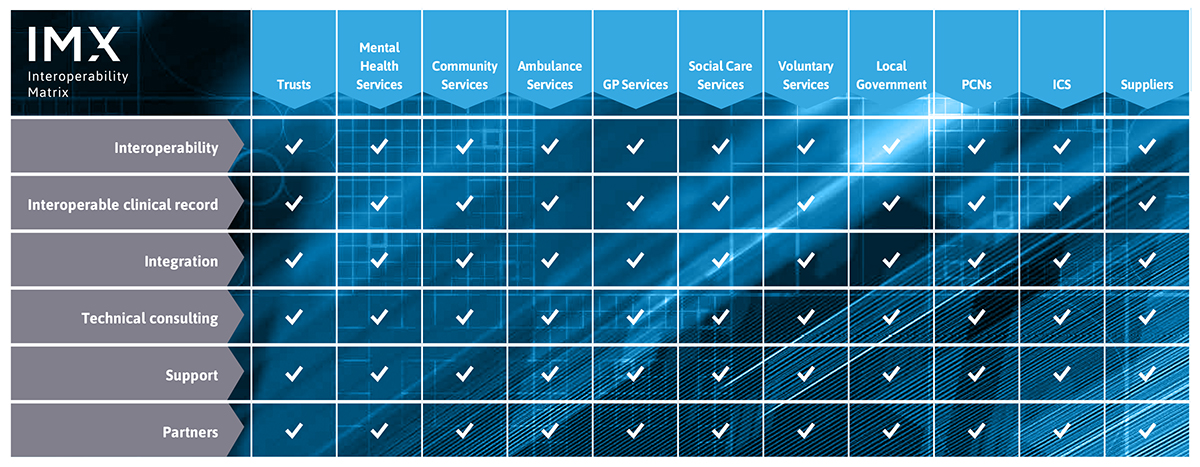Here, Managing Director Mike Symers discloses how ReStart provides IMX, an interoperability platform that can solve any interoperability issues
The deployment of Shared Care Records (SCRs) across England will solve many of the NHS’s interoperability issues, including reducing data siloes. SCRs will not provide the complete regional patient view required to efficiently deliver multiple shared patient services across two or more Integrated Care Systems (ICSs).
SCR projects are well advanced across England, with most ICSs on track to deliver the minimal viable solution by September. With very few exceptions, however, there is little consistency in approach or supplier choice between local ICSs – and that will present a problem once the SCR deadline has been met. What is the strategy for providing clinicians with data for cross-boundary care or out-of-area patients? ICS level SCRs will not solve this problem, and others and further interoperability will be required.
Connecting regional solutions
While creating SCRs has been a priority, NHS England has confirmed that cross-boundary care should continue, despite the ICS boundaries:
“The partnerships that support this collaboration (such as provider alliances) often take place on a different footprint to ICS boundaries. This should continue where clinically appropriate, with NHS England and NHS Improvement helping to ensure consistent and coherent approaches across systems.”
Regional organisations must look beyond the delivery of SCRs within each ICS and consider delivering a joined-up solution that ensures wide data availability. The good news is that ICS SCR solutions provide a perfect platform to create the complete longitudinal patient record clinicians require to provide effective cross-border care.
Challenges of linking systems
The most obvious approach to providing cross-border information is embedding one SCR within another – allowing users to view data within their local solution and click through to the neighbouring system to view data as and when required.
This approach, however, has severe limitations, including:
- It requires timely and efficient input from each ICS solution provider – many of whom may already be stretched with delivering a contracted solution.
- Embedded systems can usually only be accessed where the citizen already exists on the user’s primary system – if the user is not known to the organisation, the data will not be available.
- A direct connection between solutions will require complex IG considerations, implemented independently by several suppliers – adding inevitable delay to the process.
- A citizen’s data may be held across more than just two solutions.
- It places additional demands on users – from the need to understand multiple systems to the requirement to read through two or more complete sets of data to gain a full patient picture.
Some of these issues could be solved locally via complex integration of the data held in neighbouring solutions. However, achieving this acceptably and uniformly across all ICSs will be complicated, lengthy and expensive – and goes against the NHS England desire for a “consistent and coherent approach across systems.”
The solution
With ICSs opting for different SCR providers, almost every region now faces the challenge of working with multiple companies, none of whom have the ability or desire to inter-connect SCRs due to the complexity of the integration.
ReStart’s Interoperability Platform, IMX, contains a suite of complementary solutions and services that can be applied in several ways to solve complex interoperability issues.
Irrespective of an organisation’s technical maturity, IMX ensures the best fit solution to the immediate problem from interoperability consultancy to the implementation of an integration engine – delivering the consistency of approach the NHS demands.
IMX solves the drawbacks of direct connections between ICS solutions.
- Open technology: IMX provides a single API that provides all ICS solutions with a single interface to data.
- User experience: IMX provides role-based user access to the complete record from every ICS solution in one place.
- Digital maturity: As the central hub for sharing data, IMX empowers the rapid rollout of new, centralised or national resources to all users in one system, rather than separate ICS systems.
- IG: IMX has RBAC, consent and clearance models, which will simplify the IG considerations of cross-ICS sharing.
- Timing: ReStart’s integration expertise also means that an IMX project can be completed far faster than comparative projects.
- Cost: IMX, including integration, is less expensive than alternatives and will deliver substantial long-term financial benefits.
We believe that interoperability should be possible no matter what the combination of IT systems is. Suppose an organisation decides on a different digital strategy and, therefore, a change in IT systems. In that case, ReStart will be a reliable partner who can ensure the same high level of interoperable digital care is transferred over to the new ecosystem of systems. Our approach is based on partnerships, both with our customers and with other third-party suppliers.
About ReStart
ReStart was established in 2003, and over the past 18 years, we have provided integration services and support to over 100 NHS organisations and delivered thousands of interfaces through IMX. Our experienced team of interoperability experts has worked with most clinical and administrative systems used by the NHS. They have extensive experience implementing, developing and supporting multiple integration platforms. ReStart also provides 24/7 integration engine support for 32 NHS organisations across the UK. This experience means that we can provide NHS organisations with interoperability solutions that are quick and cost-effective.
Please note: This is a commercial profile












